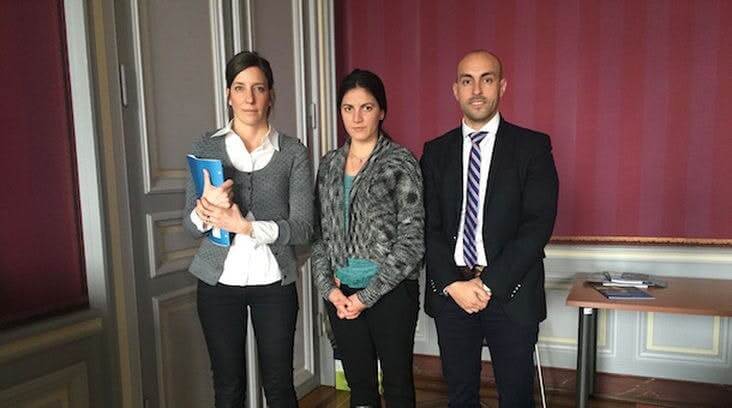In a meeting with staff members from the U.N. Special Rapporteur’s office, HRF presented the conclusions of its July 2015 legal report, which strongly suggests that Cuban dissident Oswaldo Payá’s 2012 death was an extrajudicial execution carried out by the Cuban government. Payá’s daughter, Rosa María, joined HRF at Palais Wilson and requested that the U.N. Special Rapporteur demand the Cuban government to provide an official and comprehensive explanation for each of the violations presented in HRF’s legal report.
“Almost four years have passed since the loss of the man who best embodied the peaceful struggle for democracy and freedom in Cuba. Four years of injustice for the Payá family who, to date, do not know what really happened to their loved one,” said HRF president Thor Halvorssen. “We ask both the Office of the High Commissioner and of the Special Rapporteur to question the Cuban government about evidence indicating that Oswaldo Payá’s death was caused by state agents. The Payá family deserves truth and justice,” said Halvorssen.
On July 22, 2015, the third anniversary of the death of Payá, HRF published a legal report highlighting the inconsistencies of the official government investigation following his death in 2012. HRF documented numerous due process violations, including damning witness accounts, a grossly inadequate autopsy examination, and other key pieces of evidence that were overlooked by the Cuban judicial system. HRF’s report concluded that the “evidence, which was deliberately ignored, strongly suggests that the events of July 22, 2012, were not an accident, but instead the result of a car crash directly caused by agents of the state.”
In November 2015, following the publication of the legal report, HRF submitted a petition to the U.N. Special Rapporteur, requesting that he send an allegation letter to the government of Cuba inquiring into the events that resulted in the death of Payá under circumstances that have been actively obscured by the Castro regime. Today’s meeting was convened to follow up with the U.N. Special Rapporteur about the status of the case.
“The work of independent international experts like the U.N. Special Rapporteur will not bring my father back to life, but it is crucial to remind the Cuban regime that the international community will not rest until those responsible for my father’s death are behind bars,” said Rosa María Payá, daughter of the late Oswaldo Payá. “We thank the office of the U.N. Special Rapporteur for listening to us,” she added.
“The best available evidence, which was deliberately ignored by Cuba’s judiciary, strongly suggests direct government responsibility in the death of Mr. Payá,” said Javier El-Hage, chief legal officer of HRF. “Specifically, the evidence indicates that his death was the result of a car crash directly caused by agents of the state, acting with the intent to kill Oswaldo Payá and the passengers in the vehicle in which he was riding, or with reckless indifference to an unjustifiably high risk to their lives,” said El-Hage.
Human Rights Foundation (HRF) is a nonpartisan nonprofit organization that promotes and protects human rights globally, with a focus on closed societies. HRF’s International Council includes human rights advocates George Ayittey, Vladimir Bukovsky, Palden Gyatso, Garry Kasparov, Mutabar Tadjibaeva, Elie Wiesel, and Harry Wu.
Contact: Noemi Gonzalo-Bilbao, (212) 246-8486, [email protected]
